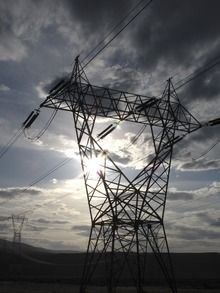Calif. refuses to generate own electricity
By Joseph Perkins
George Santayana famously warned, “Those who cannot remember the past are condemned to repeat it.”
So it is that, only a decade after the Great California Energy Crisis, during which wholesale electricity prices ran up 800 percent in an eight-month span, state energy officials once again find themselves complaining of market manipulation by an electricity provider.
In 2000, the scapegoat was Houston-based Enron, which was alleged to have created an artificial shortage in electricity, enabling energy traders to fetch premium prices from defenseless California.
A dozen years later, Houston-based JP Morgan Ventures Energy Corp. a subsidiary of banking giant JP Morgan chase, stands accused of gaming California’s $8 billion a year energy market, raking in $73 million more than it should have for the electrons it shipped to the Golden State during the first half of 2011.
Well, there’s hardly any dispute that now-defunct Enron had its way with California. And it very well may be that JP Morgan Ventures Energy took advantage of the nation’s biggest electricity consuming state.
But California is no blameless victim. That’s because it remains as dependent on electricity generated out of state as it was in 2000. And it remains subject to the tender mercies of energy companies, like JP Morgan, that couldn’t care less how much California businesses and residences pay for electricity.
It’s very much like the relationship the United States has with OPEC. Since this nation depends so much on foreign oil to meet its domestic needs, we can only bitch and moan when the sheiks hold back the supply of crude to artificially inflate prices.
Indeed, were this country producing a sufficient supply of oil to satisfy domestic demand, motorists in California and the rest of the country wouldn’t seen a 17-cent run up in pump prices during the past month.
By the same coin, the California Independent System Operator, the nonprofit corporation that oversees the state’s electrical grid, wouldn’t be chasing JP Morgan for $73 million in refunds if the state produced enough electricity to supply all of its needs.
And it’s not that California lacks the natural resources to do so. It just doesn’t want to.
That’s because our one-party state government has surrendered energy policy to hard core environmental interests, which believe that consumption of fossil fuels is on moral par with, say, clubbing baby seals.
That’s why no coal-powered electric plant has been built in California in more than two decades; why coal generates 45 percent of electricity nationwide, but only 1 percent in California.
That’s why enviros are trying to permanently shut down the state’s two nuclear power plants, though they supply 15 percent of the state’s electricity, more than generated by solar, wind and geothermal combined.
It is because California considers fossil fuels such an anathema, because it will not allow another megawatt of electricity to be produced in this state from coal, nuclear fuel or natural gas, that California imports more electricity than any other state.
And as long as California continues to rely on imported electricity, rather than electrons generated in state, it will remain susceptible to out-of-state energy providers, like JP Morgan Ventures Energy, which will continue to figure out clever new ways to game the Golden State’s energy market.
That will continue to make California consumers pay a premium for the state’s misguided energy policy.
Related Articles
How California made liquid smog
July 25, 2012 By Wayne Lusvardi How did a 1996 Federal Environmental Protection Agency “mandate” to clean up smog result
High-speed rail push leading to Nov slaughter?
July 5, 2012 By Katy Grimes Commentary This week could mark the last big, well-orchestrated push for high-speed rail. Think
LOL: Feds now tout 'higher-performing' rail, not bullet train
The federal government has long asserted that its provision of $3 billion-plus in 2009 “stimulus” funds to California for its




